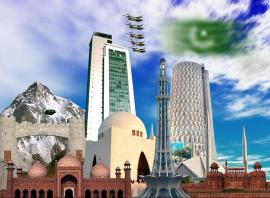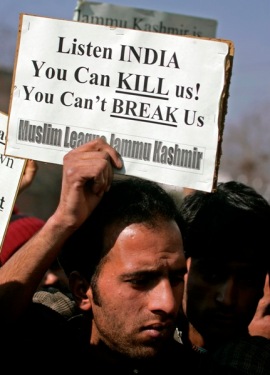India’s dirty secret is flushed out at last
January 24, 2010 Leave a comment
Times Online | It is possibly the worst job in the world, a task so disgusting, demeaning and dangerous that it has been illegal for 17 years.
However, at least 340,000 Indians (a conservative government estimate – other experts reckon the figure is close to a million) are forced to scrape a living by cleaning up other people’s excrement.
In 1993, the practice of employing a “manual scavenger” – a job description that masks the rank grossness of the work with an Orwellian flourish – was outlawed in India. So was the building of “dry latrines” – the kind that have no flush, have to be emptied by hand, and breed diseases.
The dirty truth, however, is that three government deadlines to eradicate manual scavenging, the most recent on March 31 2009, have passed. Dry latrines are still being dug all over the country, in both rural and urban areas.
A shortage of water and space and a lack of reliable sewage systems often make them the easiest, cheapest option.
At issue, however, is more than the woeful state of infrastructure in India, a country where 660 million people still defecate in the open and more households have TV sets than have proper toilets. For the persistence of scavenging speaks to the robustness of the centuries-old caste system as much as to a chronic lack of basic sanitation.
A new report by WaterAid, an NGO, highlights the how almost all manual scavengers are Dalits, the group at the bottom of the caste hierarchy, who were formerly known as Untouchables. About 80 per cent are women.
“They will often have inherited their ‘scavenging rights’ and been tasked from an early age with removing human waste from public or private toilets, which have no flushing system, to dispose of elsewhere. Men who are scavengers usually have to manually clean out sewers and septic tanks. Scavengers are paid a pittance and treated with disdain and social stigmatism,” the study says.
Ninety per cent of scavengers have no protective equipment. Diseases such as dysentery, malaria, typhoid and tuberculosis are common. Men sent down the sewers in T-shirts and loincloths often die from inhaling toxic fumes.
Social taboos complicate the business of rehabilitation. In a small village, it is hard for a former scavenger to shrug off her past. If she tries to start a small business, it is likely to be boycotted by members of higher castes.
Even before she gets that far, however, there is the issue of self worth to overcome. “Imagine how a life spent picking up s*** affects your confidence,” says Indira Khurana, the report’s co-author and WaterAid’s head of policy in India. “For these people to stand up for their rights is a difficult thing.”
Some activists suggest that what scavengers really need is relocation programmes, so they can start new lives in places where they are not known and not burdened by the accident of their birth. It sounds like something out of a spy novel, but the stigma that follows these people around is that great, they suggest.
In some areas, imaginative thinking has produced results. The mothers of the northern state of Haryana, for instance, have adopted a simple message for men who call on their daughters: “No toilet; no bride”.
The government-initiated slogan – often lengthened in Hindi to something like “if you don’t have a proper toilet in your house, don’t even think about marrying my daughter” – has been plastered on hoardings across the region’s villages as part of a drive to boost the number of proper flush lavatories.
The campaign is one of the most successful efforts to combat India’s chronic shortage of proper plumbing, local officials claim – probably because a skewed sex ratio (there are more 8 per cent more men than women) means brides are gaining more leverage in marital bargaining while women have come to resent having to defecate outside under the cover of darkess.
About 1.4 million toilets have been built in the state since it was begun in 2005, many of them with significant government subsidies. “We have more toilets, less shame among women and less disease,” said S. K. Monda, the local government official in charge of the programme.
The Haryana project offers a ray of hope that helps explain why Ms Khurana is optimistic. She says that the new India – the India that has a world-class IT industry and a space programme – is ashamed of its caste-defined past. She thinks that political pressure – Dalits constitute a powerful vote bank – is mounting and can force change – and that schemes where community members pitch in to build proper flush lavatories have been proven viable.
She also reckons that an extensive study that will document the number of scavengers in detail will expose false claims by several state governments that they have eradicated the practice and force them to act.
It is to be hoped that she is right. But even if she is, the world’s worst job seems certain to exist for some years yet.
Now, some interesting comments published in Times Online in response to this article:
Raju charles wrote:
I would like to congratulate the author of this study to expose the evil caste based system presently existing in India.Not only is this a evil but it is also a shame for the Indians to have and propagate this caste system It is not only
inhuman but also a national shame and international disgrace to the Indians all over the world.The caste minded people of India would rather have TV than toilets.It is in the Indian mentality to neglect the basic necessities of day to day living and amass materiel wealth.This is a shocking study that exposes the weakness of the caste system because the next generation inherits it due to the cultural pressures and various social taboos attached to the occupation. Then to impose on the Dalits this type of jobs.It is not by choice but by fate and the poverty of the nation that such types of living conditions exist.How can we strive for a seat in the UN security counsel? India space technology and computer technology is not match for this dry toilet technology.I wonder why this is not outsourced? The people who justify this type of primitive acts have maggots in their head and no sense of human dignity because their caste egos are shrouding their clear thinking. Truly but sadly,Raju Charles
Washington DC
Mohanraj Vattampoil Moorkoth wrote:
Unfortunately, Manmohan Singh and his team are more interested in pacifying the quarreling Ambani brothers and helping the US by buying its nuclear reactors spending crores of rupees than in solving such problems. An increase in the number of millionnaires from ten to twenty is not an indication of progress. 70% of Indians living on less than RS.20/- (less than 50 cents) per day is the result of six years of a so-called economist at the head of the government. What a shame!V.M.Mohanraj, India.
yongyuan dao wrote:
We chinese are forced by the evil Chinese communist government to use shining airplanes, magnetic elevated high speed trains, and clean houses, apartments, new high rise officies.
Indians should feel thankful that their democracy government which treasure equal rights of human beings did not force people to do these jobs. “people from low cast choose this profession voluntarily” according to sasidhar vasili.plus,
Why bother getting a toilet? if you cannot feed your family with bread…
Sad…poor Indian people…
I feel sad for them.
Why didnot the holly Dalai Lama do anything to improve the living standards of the Indians? Oh, he is busy persecuting Doji shendeng worshipers in the Tibetan exile community.
Nitka Mila wrote:
There won’t be any progressive changes until the India population realise that all are equal in their land and all should have same human rights and access to same basics facilities. And there is no use of saying that because something had been going on for over 3,000 years it is still good enough to take place now in this high tech, high quality life style rich Indian’s and we in the west are having or have rights of obtaining it. I LOVE the slogans “no toilet – no bride”. It shows they have heaps of sense of humour even when tackling life’s most awful circumstances..;-)) I hope there will come the time when Indian as people can stand up and be counted on equal platform. On the other hand, I watched this archaeological piece done by BBC which showed and described the most amazing sewage system build by Chinese around 4,000 years ago. For them it was crucial thing to have – basic life’s necessity. It makes you wonder why other great civilizations of that time did not make or are still not making it their basic necessity.




































Recent Comments